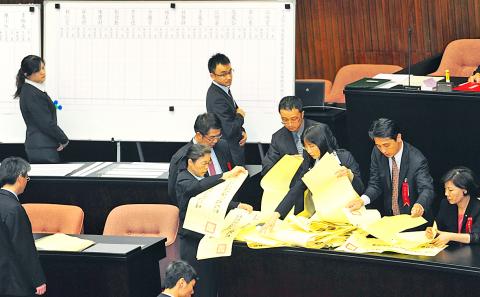Eleven Control Yuan candidates nominated by President Ma Ying-jeou (馬英九), from a list of 29 that has been described by opposition parties as “the worst roster in history,” were voted down by the legislature yesterday.
The vote took place after a blockade by opposition parties in the early morning and subsequent cross-party negotiation led the Chinese Nationalist Party (KMT) to agree not to enforce party discipline on how its legislators voted.
The Democratic Progressive Party (DPP) and the Taiwan Solidarity Union lawmakers arrived on the legislature’s floor an hour before the meeting started and occupied the legislative speaker’s podium, protesting the ruling party’s resolution made on Monday, despite dissent from some KMT members, that the party as a whole would “give full support to all of the nominees.”

Photo: Lo Pei-der, Taipei Times
During the blockade, the opposition also accused some of the nominees of influence-peddling before the start of the second legislative extraordinary session that had been scheduled to execute the confirmation vote.
The KMT caucus had concluded on Monday that party discipline would be used if any of its legislators voted otherwise, and refused to promise not to supervise how its legislators voted by requiring them to show their marked ballots.
The opposition’s blockade did not end until just before noon yesterday, when the ruling party backed down and agreed to have the voting booths and boxes placed in a way that the voters would not be monitored. The KMT also agreed to allow the legislators to vote one by one, rather than in groups.
Chang Po-ya (張博雅) and Sun Ta-chuan’s (孫大川) nominations were approved for the positions of president and vice-president of the Control Yuan respectively.
Chang received 57 yes votes, 36 no votes and 14 invalid votes, while Sun had 60 yes votes, 33 no votes and 14 invalid votes.
The two are to begin their six-year terms on Friday.
The legislature conducted the confirmation vote for the rest of the nominees in the afternoon. After hours of voting and counting, it was revealed that 11 had failed to secure the required 57 votes, which is one more vote than half of the total 112 legislative seats.
Those who were voted down include former Food and Drug Administration director-general Kang Jaw-jou (康照洲), to whom the Control Yuan had issued at least 19 corrective measures concerning food safety during his term as head of the agency, former Public Construction Commission minister Fan Liang-shiow (范良銹), who had also several times been issued corrective directives by the Control Yuan, and Shih Hung-chih (施鴻志), a retired professor of urban planning with a record of handling controversial land expropriations.
National Medical University professor Wang Hui-po (王惠珀), Lee Ping-nan (李炳南) and Yu Teng-fang (余騰芳), who were not in the recommendation list at first, or voted out by the recommendation team then chosen by the president, were among the ousted.

AGING: As of last month, people aged 65 or older accounted for 20.06 percent of the total population and the number of couples who got married fell by 18,685 from 2024 Taiwan has surpassed South Korea as the country least willing to have children, with an annual crude birthrate of 4.62 per 1,000 people, Ministry of the Interior data showed yesterday. The nation was previously ranked the second-lowest country in terms of total fertility rate, or the average number of children a woman has in her lifetime. However, South Korea’s fertility rate began to recover from 2023, with total fertility rate rising from 0.72 and estimated to reach 0.82 to 0.85 by last year, and the crude birthrate projected at 6.7 per 1,000 people. Japan’s crude birthrate was projected to fall below six,

US President Donald Trump in an interview with the New York Times published on Thursday said that “it’s up to” Chinese President Xi Jinping (習近平) what China does on Taiwan, but that he would be “very unhappy” with a change in the “status quo.” “He [Xi] considers it to be a part of China, and that’s up to him what he’s going to be doing, but I’ve expressed to him that I would be very unhappy if he did that, and I don’t think he’ll do that. I hope he doesn’t do that,” Trump said. Trump made the comments in the context

SELF-DEFENSE: Tokyo has accelerated its spending goal and its defense minister said the nation needs to discuss whether it should develop nuclear-powered submarines China is ramping up objections to what it sees as Japan’s desire to acquire nuclear weapons, despite Tokyo’s longstanding renunciation of such arms, deepening another fissure in the two neighbors’ increasingly tense ties. In what appears to be a concerted effort, China’s foreign and defense ministries issued statements on Thursday condemning alleged remilitarism efforts by Tokyo. The remarks came as two of the country’s top think tanks jointly issued a 29-page report framing actions by “right-wing forces” in Japan as posing a “serious threat” to world peace. While that report did not define “right-wing forces,” the Chinese Ministry of Foreign Affairs was

PREPAREDNESS: Given the difficulty of importing ammunition during wartime, the Ministry of National Defense said it would prioritize ‘coproduction’ partnerships A newly formed unit of the Marine Corps tasked with land-based security operations has recently replaced its aging, domestically produced rifles with more advanced, US-made M4A1 rifles, a source said yesterday. The unnamed source familiar with the matter said the First Security Battalion of the Marine Corps’ Air Defense and Base Guard Group has replaced its older T65K2 rifles, which have been in service since the late 1980s, with the newly received M4A1s. The source did not say exactly when the upgrade took place or how many M4A1s were issued to the battalion. The confirmation came after Chinese-language media reported